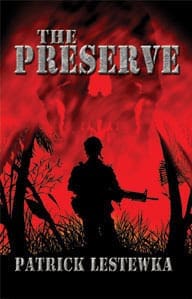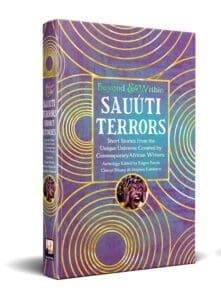
Synopsis:
In the summer of 1967, seven men, members of an elite combat unit, embarked on a covert operation in the jungles of Vietnam. Two died. The survivors were forever changed.
Twenty years later, the remaining unit members receive a letter from an anonymous benefactor, along with a check for $50,000 and a promise of more to follow-if they agree to one final mission. Their task is simple: journey to the wilds of northern Canada to track down and kill three escaped convicts. The convicts are starving and unarmed. Easy money. A cakewalk. But they have no idea what lays in wait on the snow-topped tundras and in the dark forests of the frozen north. Waiting with sharp teeth and slitted eyes and an old score to settle.
They have no idea…but they will.
Soon.
They have entered…
THE PRESERVE
Review:
I often praise Nick Cutter for his ability to create such visceral passages. Descriptions that crawl under your skin and set up camp. The infamous turtle scene in “The Troop,” is permanently etched into my brain, there’s some gnarly insect horror in “Little Heaven,” that continues to make me cringe to this day, and his upcoming novel “The Queen,” has a death just as grisly and memorable- that has already taken permanent residence in my head. Arguably an author that flirts with aspects of the extreme, some may wonder what pandemonium, what hell, would be unleashed if Cutter took the plunge, and embraced the splatter. Due to its scarcity, few know that he already has. “The Preserve,” (written under Craig Davidson’s little-known second pseudonym- Patrick Lestewka) is a brutal, bizarre and downright blasphemous bloodbath, painting themes of morality and the balance of order and chaos with a gore-dipped brush. You can’t get ahold of this book without paying an ungodly amount of money, that no novel is really worth, but should you get the opportunity to read it, take it.
It’s 1967 and the war in Vietnam is raging. Brought together by Uncle Sam, black-ops team “The Magnificent 7,” lead by “Oddy,” grapple with their morality. The team is disassembled after a disastrous mission, the dust settles, and the five that make it out alive are thrust back into an unforgiving reality, in which they are left alone to process their trauma, and try and make an honest living. However, the scars of war are deep, and none find the peace they seek. One “extracts,” information for mobsters, another is a gambling addict, there’s a hitman, a porno director,… their old leader, a bank robber. All 5 are at somewhat of a loose end, left adrift in a world that offers no answers…
Until…
Each man receives a letter in the post, an invitation to a Canadian bar, alongside a first class ticket to Toronto, a blank check for $50,000, and the assurance that should the men travel to meet the sender, he will sign on the dotted line. When the enigmatic and eccentric “Anton Grosevoire,” reunites the remnants of the “Magnificent 7,” he follows through on this. He also tells them that there’s more where that came from, should they want to embark on one final mission. Less than 24 hours later the 5 of them are deposited in “The Preserve,” tasked with hunting down escaped supermax prisoner and mass murderer “Marcus Overton.” It’s a matter of minutes before the group learns that the preserve is not quite the animal sanctuary the name suggests. The undead roam free, wampir lurk in the forest, and something truly malevolent lies at the heart of this twisted game. Should they make it out alive, luxury awaits, but the clock is ticking, and their chances seem to only be getting slimmer.
Much like in John Lynch’s “The Warrior Retreat,” Lestewka explores the psychological aftereffects of war. The characters we follow have committed their fair share of atrocities, our capacity for sympathy is challenged, it’s impossible to empathise, yet Lestewka subtly threads a narrative that reveals glimpses of humanity within them—a lingering trace of goodness that defies the monstrous roles they’ve assumed. Shaped by the crucible of war, we watch them become killing machines, and then reminisce, regret and try to atone. Whilst some chapters are dense with military terminology- the main theme that emerges is not of warfare, but of the brotherhood that is forged in its flames, creating a complex interplay between trauma and the ties that bond them together.
As aforementioned, the writing is unapologetically extreme, and extremely grisly. Whilst writing, there are multiple passages that spring to mind, sunbeds are not something I can view the same way now. Crucially, this depravity compliments, rather than detracts from, the themes and messages taken from it. Violence and gore are instruments used to underscore the fragility of order and the potential for chaos. As the novel progresses, Lestewka shifts into a more cosmic realm, representing chaos not merely as a backdrop to human suffering but as an active, omnipresent entity. The idea that for every lottery win, there is a bankruptcy, for every newborn, there is a flatline… order is offset by chaos. This duality is a deeper inquiry into the imbalance of order and chaos. Does the universe really operate on a fulcrum where every act of creation is mirrored by an act of destruction? I don’t know, but the thought is a depressing one. This interplay between extremes takes the narrative from mere horror and elevates it to a commentary on the tension between stability and entropy.
In “The Preserve,” Lestewka masterfully stitches together visceral horror with existential reflection. The novel’s grotesque (but not gratuitous) imagery and flawlessly executed character arcs are used to dissect the lingering scars of war and the possibility that cosmic forces that govern our lives. Violence here is not a spectacle but a catalyst, revealing the thin, fraying threads that tether us to stability. As the story plunges into the abyss of human and cosmic entropy, we’re forced to question whether chaos is not a disruptor, but a necessary counter to order.









Leave a Reply